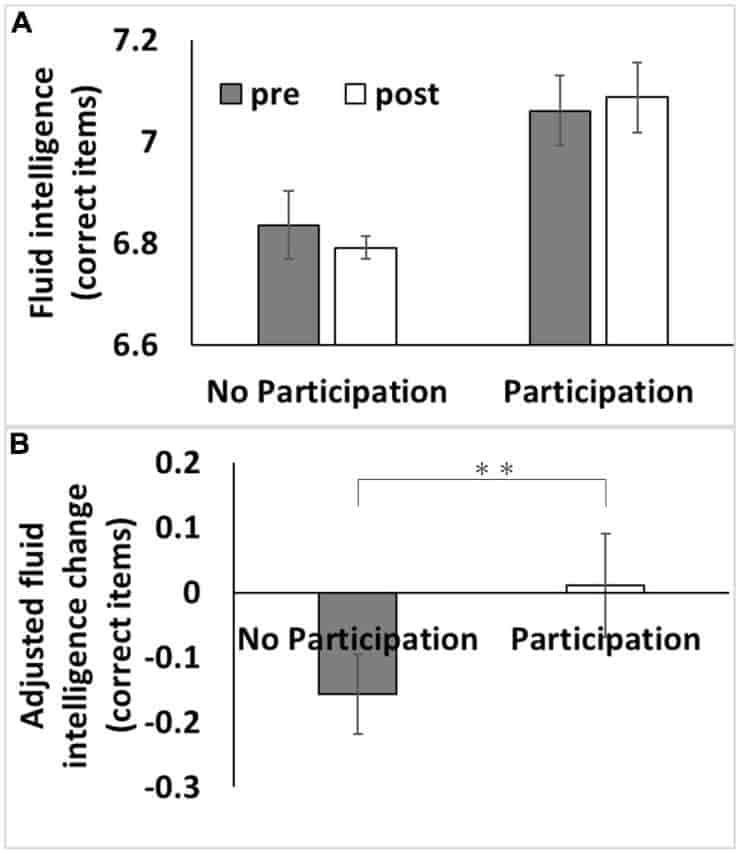Taking an adult education class is associated with a lower risk of cognitive decline and dementia, according to researchers from the Institute of Development, Aging and Cancer of Tohoku University in Sendai, Japan.
Regular cognitive activity, such as brain challenges, sudoku, or specific video games in middle and old age, is known to protect against cognitive decline and dementias such as Alzheimer’s. Many people routinely participate in adult education classes, such as learning a new language or skill.
“Here we show that people who take adult education classes have a lower risk of developing dementia five years later. Adult education is likewise associated with better preservation of nonverbal reasoning with increasing age,”
said the study’s first author, Dr. Hikaru Takeuchi.
Dementia Risk Score
Takeuchi, along with co-author Dr. Ryuta Kawashima. evaluated data from the UK Biobank, which has genetic, health, and medical information on roughly 500,000 British volunteers, of whom 282,421 were analyzed for this study.
These people were enrolled between 2006 and 2010, when they were between the ages of 40 and 69. By the time the current study was conducted, they had been observed for an average of seven years.
Participants were given an individual predicted polygenic risk score for dementia based on their genotype at 133 significant single-locus polymorphisms (SNPs) in their DNA. Participants self-reported whether or not they completed adult education classes, but did not specify the frequency, subject matter, or academic level.
19% Lower Risk

Credit: Front. Aging Neurosci. 15:1212623 CC-BY
The authors focused on data from the enrollment visit and third assessment visit (between 2014 and 2018). During these visits, participants were administered a battery of psychological and cognitive assessments, including tests for fluid intellect, visuospatial memory, and reaction time, among others.
During the study’s time frame, 1.1% of the sample population developed dementia.
Takeuchi and Kawashima demonstrated that participants enrolled in adult education had a 19% lower risk of developing dementia than those who did not. This held true for both Caucasian and non-Caucasian individuals.
Nonverbal Reasoning and Fluid Intelligence
Importantly, when participants with a history of diabetes, hyperlipidemia, cardiovascular disease, malignancy, or mental illness were excluded, the outcomes remained unchanged. This means that the observed lower risk was not solely attributable to symptoms of these known co-morbidities preventing participants with early dementia from pursuing adult education.
Participants who attended adult education classes maintained their fluid intelligence and nonverbal reasoning abilities better than their counterparts who did not. However, adult education had no effect on visuospatial memory preservation or reaction time.
“One possibility is that engaging in intellectual activities has positive results on the nervous system, which in turn may prevent dementia. But ours is an observational longitudinal study, so if a direct causal relationship exists between adult education and a lower risk of dementia, it could be in either direction,”
said Kawashima.
Next Steps
To establish whether adult education has any protective effects, Takeuchi suggested conducting a randomized clinical trial.
“This could take the form of a controlled trial where one group of participants is encouraged to participate in an adult education class, while the other is encouraged to participate in a control intervention with equivalent social interaction, but without education,”
said Takeuchi.
The authors do acknowledge a few limitations to the study. It should be noted that this is an observational cohort study rather than an interventional study. It’s possible that some unidentified preclinical dementia symptoms were overlooked, which may be linked to baseline enrollment in adult education courses.
The age range seen in this study, they write, was slightly skewed toward an earlier age of dementia onset, which might have reduced the statistical power of the analysis.
In addition, dementia diagnoses derived from healthcare records may lack sensitivity, and there may be distinctions between the UK Biobank population and the general population. These are typical limitations of prospective dementia studies conducted by the UK Biobank.
This study did not have access to the exact content of adult education classes. In the future, it may be of interest to investigate which types of adult education class participation are most connected with cognitive retention and a lower risk of dementia.
Reference:
- Takeuchi H and Kawashima R (2023) Effects of adult education on cognitive function and risk of dementia in older adults: a longitudinal analysis. Front. Aging Neurosci. 15:1212623
